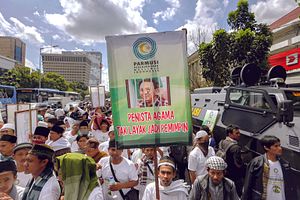Massive protests in Indonesia’s political epicenter, Jakarta, and scaremongering by Islamists and prominent Indonesian military leaders are shredding any hope that Indonesia’s relatively tolerant pluralistic political landscape will endure. All of this has occurred against an alarming backdrop of increased religious intolerance, vigilantism, and large numbers of Indonesians traveling to join the Islamic State in Iraq and Syria (ISIS).
There is no straightforward explanation for what is happening in the Indonesian political arena. The issue at the top of the nation’s news feed has been the alleged criminal blasphemy of incumbent Jakarta Governor Basuki Tjahaja Purnama, also known as Ahok, and the huge backlash that this has generated amongst Indonesia’s conservative Islamist groups. Even with the elections for Jakarta governor slated for February 15, the country looks set to remain mired in political uncertainty for far longer. The uproar enveloping Ahok, who is Chinese-Indonesian and Christian, reached its apotheosis in November and December last year when over one million people took to the streets in Jakarta demanding he be arrested for criminal blasphemy.
Ahok’s troubles stemmed from public outrage in response to provocative statements he made last year asserting Quranic scripture was being used deceptively by some political elites. Since then, his criminal trial has received saturated media coverage just as gubernatorial candidates, including Ahok himself, frantically campaign to be elected Jakarta governor – the second most influential publicly elected office in the country after the presidency.
In conversations with rally-goers in December, The Diplomat was informed that their grievances extend beyond Ahok’s verbal transgressions and hinge on old racial prejudices and fears of Chinese-Indonesian political and economic dominance.

































